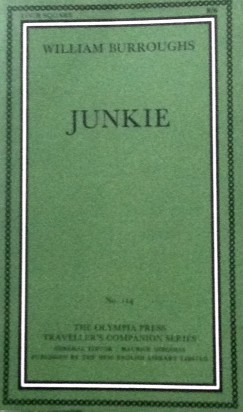Inspiring Older Readers
 posted on 18 Jan 2016
posted on 18 Jan 2016
Junkie by William Burroughs
So what is this? A memoir written under the pseudonym of William Lee or a novel written by William Burroughs – or maybe both? What I do know is that this is a classic cult book that has seen its reputation come and go and come again over the years.
What seems to be undeniable is that much of this book is a thinly veiled record of Burrough’s own addiction to opiate-based drugs but it is also clearly not just a straight record of his experiences. Although he seems to be writing in a flat, journalistic style dispassionately setting out his history of drug addiction, there’s more to it than that. This is also a journey into the compulsive mind-set of an addict which shows just how monomaniacal and self-delusional individuals who are addicted to anything ( drugs, drink, sex) can be.
What Burroughs gives us is a guided tour of the twilight world of drug users and sharp little portraits of the characters that are trapped in this world. Almost imperceptibly he spirals further and further down the circles of this hell and the people he encounters become more and more gargoyle-like. Startlingly, however, he never takes any kind of moral position or passes judgement – once he is ensnared in the web of addiction he is full of a sort of abstract regret but he has neither the desire or impetus to escape.
He floats in and out of addiction, in and out of police custody and in and out of rehab on a seemingly never ending cycle – and in reality Burroughs himself never did escape the shadow of addiction until he died in 1995.
The book is entirely one dimensional and gives the William Lee character no real life outside that of drugs. It’s not until well into the second half of the book that we discover that he has a wife and family. This unrelenting focus on his drug identity is an entirely accurate reflection of the unstinting focus the addict has on their drug of choice. However, one consequence of this is that the life of the addict seems astonishingly tedious and there are times in the book that you find yourself thinking that it’s hard to take much more of this.
The book ends not with some miraculous cure but quite the opposite. Junk is death and the author knows it – he even embraces it. As he concludes the book Burroughs is beginning to think about the future. The people who populate this book belong to the social problems of the past but new people are coming along and discovering drugs for different reasons. The book stands on the brink of a changing world and changing attitudes to narcotics – which might help to explain why this book was taken up by so many in the 1960s counter-culture and Hippiedom.
Many critics describe this book as full of energy and verve but I can’t see it that way myself. I thought it was an important but rather depressing affair albeit one which was incredibly well written – even if unconventional in style and approach.
There are plenty of paperbacks of this book that can be picked up for not very much and at about 150 pages it’s a window on a world that’s worth exploring – even if it ultimately is a world I can have very little sympathy with.
Terry Potter
January 2016